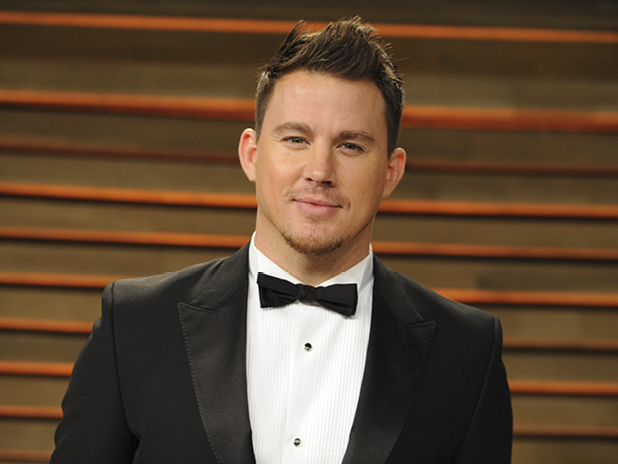It’s All a Game to Channing Tatum
Two moves in, Channing Tatum has already won. I successfully removed a block from the middle of the tower of small wooden bricks, but as I try to place it gently on the top of the tower, according to the dictates of the game, two blocks tumble from the top. If there’s one skill required to play (and win) the game of Jenga, it is steady hands. But, the dynamics of this particular game are a little uneven. He’s Channing Tatum. I’m not. I’m a little nervous. He says he is, too, but this is not honest. My hands, already uncoordinated (and, full disclosure, comically small), are a bit shaky.
“Alright, we won’t count it,” Tatum says, magnanimously, “but technically, I won.” He pulls a block from somewhere near the bottom, puts it on top, the tower doesn’t move.
It’s not that Channing Tatum—Chan, when he shakes my hand—is intimidating. He is, in fact, as friendly as you would imagine. Cordial, laid back, professional, a bro in a completely un-obnoxious way. He’s dressed for a day of rapid-fire press interviews: loose dark jeans, and a grey oxford, twice unbuttoned, sleeves rolled up. Nothing impressive.
The setting, though, isn’t exactly relaxing. We’re in a small, non-descript meeting room in an otherwise posh hotel in downtown Toronto. In the corner, there’s a woman with a camera set up, as if she’s on break from taking class pictures. She never once looks up from her phone, which isn’t a problem except Jenga is always more nerve racking with an audience—it’s like typing with someone watching your screen. Fingers just don’t work.
But, I came prepared. It’s never easy to connect with a celebrity, let alone have an interesting conversation, within the rigid confines of a junket—even when you’re afforded more time than anyone else. Thus, in my bag I’ve brought some conversational ammo: two beers, The Book of Questions (a cocktail party classic from the ’80s, which, as the name suggests, is full of questions to spark moral conversation), Jenga, and maybe some other stuff that isn’t strictly speaking legal. I’m a goddamned Boy Scout. A shaky Boy Scout.
* * * *
While it seems to a certain extent like cheating, bringing this bag of activities to a hotel suite junket interview, as far as board games go Jenga had a certain metaphoric potential that was hard to resist. Over the past few years, Channing Tatum has been steadily building a tower of achievement, made more impressive by repeatedly thwarting the threat of failure. Who would have thought someone could make an honest, un-ironic comedy about male strippers? Or successfully adapt a best-forgotten teen melodrama from the ’80s into one of the best buddy action-comedies since, say, Hot Fuzz? And then pull off a sequel to boot? (“On paper Jump Street sounds like a terrible idea. Everyone on my team was like, ‘Don’t do this movie,’” Tatum says). Block from the bottom, put it on top; tower doesn’t move.
His next films are just as risky. Foxcatcher, a dark drama about the murder of an Olympic wrestler by an unhinged coach played by Steve Carell, which has already received heaps of praise, and Jupiter Ascending, a gonzo space opera by the Wachowski siblings that has Tatum sporting blonde hair and Spock ears. Then, a Magic Mike sequel. Take a block from the middle, put it on top.
It’s not a perfect metaphor. Because at this point, there’s probably no project, box-office bomb or otherwise, that would bring down Channing Tatum. The man has become, perhaps surprisingly, one of the most important actors working today. Incredibly versatile, universally admired.
Maybe the most interesting thing about Channing Tatum, and I tell him this, is that we got to see him become a great actor. So often actors either come fully formed, trained off-screen somewhere, or they plateau early, settling into a comfortable character-brand. But take one of his first roles, in She’s the Man, an Amanda Bynes romcom made when Amanda Bynes was at her charismatic peak. Tatum’s role was pretty thankless—he’s the man meat. But it’s not like he does much with it. His performance is self-conscious, awkward, like he knows he was only hired for his looks. Then, watch Magic Mike (which, it should be said, relies even more on his man-meaty-ness) and the difference is striking. Tatum fills the screen effortlessly, he’s captivating, honest.
“I’m still picking it up, and I plan to be learning it until they don’t let me. It’s a constant sort of finding it,” he says. “You’re in a room, in a dark room, and you find the walls and the shape of the room. You can choose not to do this, but why are you here? Why did you want the job? For me, I love the work. I really do.”
Then, because by now, you’re likely curious how the Jenga game is progressing, I pick out a particularly precarious brick and expertly rest it on the top. “That kind of fucks you,” I say. “I know,” he says, then picks out an even trickier piece, and completes his turn. Snaps his fingers. “I’m not messing around now.”
* * * *
Tatum hasn’t just learned how to act over the last few years of his stardom. He’s become the embodiment of the All-American Success Story. Natural talent, hard work, living the dream. Perhaps what makes it uniquely American is its messiness, for lack of a better word. Like Jay-Z’s narrative, kind of. Tatum never did well in school, he played some college football, worked odd-jobs—including stripping—then became a model. He had a gig dancing in a Ricky Martin video (though he’s nearly impossible to see in that particular orgy of feigned heterosexuality).
It was after he started acting, though, and acting well, that he found other talents. Writing. Producing. It’s that impossible notion that you can have multiple talents, so long as you work hard enough to discover them, and have the opportunity to exploit them. “I’ve learned a lot about life, about myself, and, just in general, stories. I’ve realized how much I love stories, and how much I’ve learned from movies. I was never a big school guy, so I learned a lot from TV and film,” he says.
And that growth is still visible. At times he speaks like a jock just falling in love with a freshman Englih lit class, and making poetry of constricted expression. He’ll mispronounce words, or mix up terms. There is a certain way serious actors should be able to speak, use words like “binary,” or “intellectualize,” or “architecture of that story” and he wrestles with them. But because he’s so earnest, it never feels pretentious. In fact, it feels condescending mentioning it. It’s not that he’s trying to play the part of an actor/screenwriter, though that’s what he’s become with the Magic Mike sequel, it’s that he’s, well, learning. You know, like a real person.
“I could barely read, to be completely honest. I was always the last to get up from a test. I read at an epically slow level, and just even grammar… I grew up in the south. I mumble, and I don’t speak right. It’s just what it is,” he says, “Literarily, I never saw myself as a writer, but I’ve always loved stories.”
That love of stories is a kind of intelligence—empathetic, intuitive. And because the dichotomy between book and street smarts has been well defined, it should be stated that Channing Tatum maybe the street-smartest actor working.
He also works impossibly, distressingly hard. But, somehow he hasn’t managed to ever seem like he isn’t having fun. To say acting is all a game to Tatum is true, but it’s not a game in a frivolous, or worse, a Machiavellian way. It’s play, undertaken with the deadly seriousness of an imaginative kid. That kind of play is actually a lot like work.
* * * *
The tower we’re cannibalizing to build up is getting taller. Wobbling. It seems an apt time to ask him about strategy, as it relates to things non-Jenga-specific. Does he have a secret bunker wherein he meets with the Hollywood illuminati, so he can only pick massive hits?
“I wish I could tell you there was a strategy to it [but] I think that’s a recipe for disaster,” he explains. “Because I don’t think it comes from your heart—you’re intellectualizing what you think is what people will want to see, instead of what you want to do. That is you trying to play a good game. I just did a film, I won’t say what name it is, but, I don’t actually know how this movie is going to do, but I know when I went to go do it, it was a huge risk. I wanted to just go do it because I loved the idea of the movie. It probably could not work, and at the end of the day, it doesn’t matter to me, if my intention was really pure and clear. You can’t just want to go out and win. The result of winning your opening weekend, or whether it got good reviews, can’t be what you’re going after. It has to be the actual process of going out and creating something. I think that’s all I’ve really tried to do,” he says.
Then, crash. The tower tumbles, spreads across the plastic table. On the recording later, it sounds epic. It was my turn. I lose.
Tatum is up instantly. “I WIN! I WIN!” He bounces through a small victory lap around the room, cackling, making onomatopoeic pronouncements. “Winner winner, chicken dinner!” It’s exactly the reaction you’d want from Channing Tatum. Physical, honest, gently goofy and yet still cool.
Metaphorically, it works. He wins.










